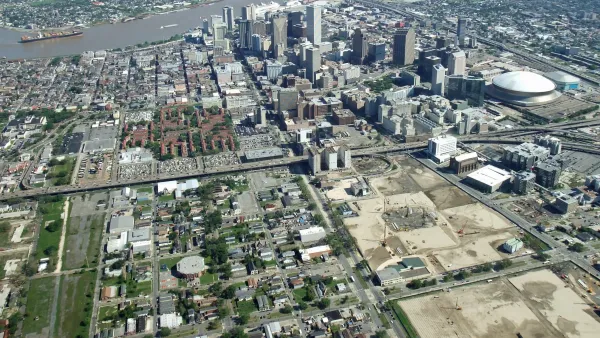Ten years ago, a number of architecture firms went to New Orleans in the wake of Hurricane Katrina for a humanitarian "experiment"—rebuilding part of the underserved Lower Ninth Ward as an innovative, LEED Platinum, affordable community.
Today, tour buses regularly visit the hundred or so cheerfully colored, creatively shaped houses designed by high-profile architects like Frank Gehry and Thom Mayne—where residents may pay as little as $25 a month for utilities.
The "starchitects" were invited by Brad Pitt’s Make It Right Foundation. So was community planning and design firm Concordia, which also coordinated the New Orleans' "People's Plan"—a recovery plan grounded in input from the residents of the vulnerable and long-neglected Lower Ninth Ward.
"The people in the trenches were the heroes," according to Concordia founder Steven Bingler. "They stepped up—literally out of four or eight feet of water, or off of a rooftop—then picked themselves up and got engaged in the recovery."
Two previous attempts at recovery plans sparked suspicion of racial bias and fear that communities of color in the Lower Ninth would be wiped out altogether. Finally, the Greater New Orleans Foundation and the Rockefeller Foundation partnered with Concordia, which undertook an extensive citizen engagement process to revive—not replace—the community.
Bingler remembers a crowded Convention Center, where two-way broadcast connections and classroom clickers enabled people who had fled as far as Atlanta to participate in the planning process for their home neighborhoods.
Martin Pedersen, a longtime architecture journalist, notes that this commitment to inclusion is rare in the field. "Architects’ idea of community engagement is to first think of a design and then sell it to an oftentimes-reluctant public. That’s called 'bringing them around.' But really, is that any different from what a used-car salesman does?" he says.
For Pedersen, New Orleans is proof that "authentic" community engagement can transform whole cities. He tells The Planning Report:
"What was amazing about the post-Katrina experience—watching it from afar—was that the city didn’t have a huge civic infrastructure of democratic involvement. They had to grow it on the fly… The neighborhoods that came back the strongest are the ones that organized and participated fully. The ones that didn’t were often spread out and without a voice."
Much has been accomplished in New Orleans since the storm, but the city still has a good deal of recovering to do—as well as preparation for future weather events. Looking back on what occurred 10 years ago, Bingler issues a warning to other cities to look forward, too: "We’re going to have to apply our hard-earned experience in a lot of other places in the next 40–60 years."
Bingler and Pedersen are co-authoring the forthcoming book Building on the Common Edge. Read their full joint interview in The Planning Report.
FULL STORY: Katrina + 10: It's Engaged Citizens Who Saved New Orleans

Analysis: Cybertruck Fatality Rate Far Exceeds That of Ford Pinto
The Tesla Cybertruck was recalled seven times last year.

National Parks Layoffs Will Cause Communities to Lose Billions
Thousands of essential park workers were laid off this week, just before the busy spring break season.

Retro-silient?: America’s First “Eco-burb,” The Woodlands Turns 50
A master-planned community north of Houston offers lessons on green infrastructure and resilient design, but falls short of its founder’s lofty affordability and walkability goals.

Test News Post 1
This is a summary

Analysis: Cybertruck Fatality Rate Far Exceeds That of Ford Pinto
The Tesla Cybertruck was recalled seven times last year.

Test News Headline 46
Test for the image on the front page.
Urban Design for Planners 1: Software Tools
This six-course series explores essential urban design concepts using open source software and equips planners with the tools they need to participate fully in the urban design process.
Planning for Universal Design
Learn the tools for implementing Universal Design in planning regulations.
EMC Planning Group, Inc.
Planetizen
Planetizen
Mpact (formerly Rail~Volution)
Great Falls Development Authority, Inc.
HUDs Office of Policy Development and Research
NYU Wagner Graduate School of Public Service



























